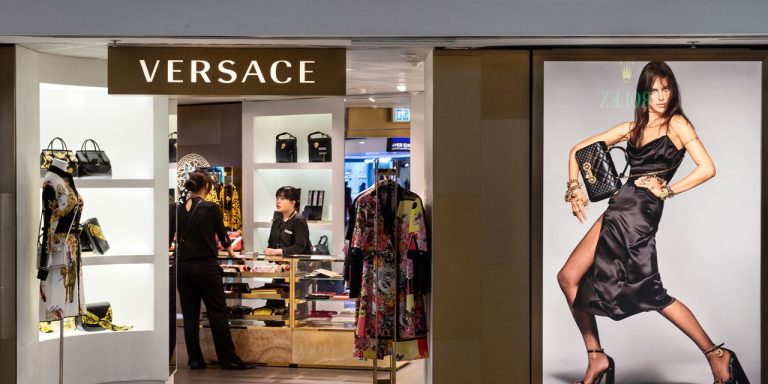Stock in Versace’s owner,
Capri
Holdings, surged more than 50% Thursday after it agreed to be acquired for $8.5 billion by
Tapestry,
parent of the Coach brand.
Capri (ticker: CPRI) shareholders will receive $57 per share in cash, a 65% premium to Wednesday’s closing price. Capri’s market capitalization at Wednesday’s close was $4.06 billion.
The merger with
Tapestry
(TPR) would leave the combined company better placed to compete with the likes of
LVMH Moet Hennessy Louis Vuitto
(LVMHF) and Gucci parent
Kering
(PPRUY).
The transaction is expected to close in calendar 2024.
Capri, which also owns fashion brands Michael Kors and Jimmy Choo, was due to report fiscal-first-quarter earnings Tuesday but rescheduled to Thursday. The company reported adjusted earnings of 74 cents a share, beating analysts’ expectations for 71 cents a share. Revenue of $1.23 billion was in line with projections, even though it declined 9.6% compared with the previous year.
Shares of Capri and Tapestry inched up 0.1% and 0.2%, respectively, in after-hours trading. The moderate gains follow an eventful trading day, which saw Capri stock close 56% higher, and Tapestry 16% lower. So far this year, Tapestry is down 8.9%, while Capri is off 6%.
Generally, either company can terminate the merger agreement if it isn’t completed by Aug. 10, 2024. However, if Capri agrees to a better offer or scuttles the deal under certain circumstances, it is obligated to pay Tapestry a termination fee of $240 million in cash, according to a form Tapestry filed with the Securities and Exchange Commission.
Jefferies analyst Ashley Helgans wrote in a note to clients on Thursday, “We view the deal as positive for CPRI shareholders, but are surprised TPR would want to acquire the [company] given existing brand similarities, momentum with current strategy, and potential execution issues.” Helgans has a Hold rating on Capri stock, and a Buy rating on Tapestry.
TD Cowen’s Oliver Chen views the deal as an attractive one, adding that it is unlikely there will be other bidders for Capri, given that some of its largest brands—such as Michael Kors—are in need of a revamp. In its fiscal first quarter, Capri saw annual sales declines across two of its three fashion houses. Michael Kors sales slid 13.8% to $787 million, while Versace sales declined 5.8% to $259 million.
Both figures were ahead of expectations. Jimmy Choo revenue jumped 6.4% to $183 million, also better than projected.
“We believe TPR has prior turnaround capabilities, a leading customer data platform, China momentum, and can add greater cultural relevance and brand heat to Michael Kors,” Chen wrote in a note to clients. Chen has a Market Perform rating on Capri stock, and an Outperform rating on Tapestry stock.
On a call with investors on Thursday, Tapestry’s management team said it was already in conversations over how to modernize Michael Kors and encourage customers to be more engaged with its products.
Fashion deals have been in vogue in recent years, most notably as French luxury giant
LVMH
acquired Tiffany in 2021. Tiffany was a key contributor to the 10% profit growth posted by the group’s Watches & Jewelry segment in the first half of 2023, LVMH said when it reported earnings last month.
Rival European fashion group Kering announced a deal to buy a 30% stake in Italian luxury fashion house Valentino for €1.7 billion ($1.87 billion) in July. It includes an option to buy 100% of Valentino by 2028.
To date, LVMH owns 75 luxury brands, including 14 major fashion houses, including Loewe, Louis Vuitton, Fendi, Celine,
Christian Dior,
and Marc Jacobs. Kering owns 13, including Gucci, Balenciaga, and Saint Laurent. And as these companies grow their holdings, they have also expanded their global reach, winning market share in the U.S.
Tapestry’s acquisition will better position the American company to compete with its European counterparts, analysts say.
“The addition of Michael Kors cements TPR as the number one player in the accessible luxury handbag market in the U.S. by a wide margin,” wrote Ike Boruchow, an analyst at Wells Fargo. “Further, the addition of Versace (and to a lesser extent Jimmy Choo) add luxury assets to TPR’s portfolio that will help them better compete with European luxury houses such as Kering and LVMH.” Boruchow rates both Capri and Tapestry stock at Outperform.
According to the companies’ press release, the acquisition enhances Tapestry’s portfolio in the pure-play luxury segment, and expands its global reach, especially in Europe and Asia. On a pro forma basis, the combined company generated global annual sales of over $12 billion across more than 75 countries in the last fiscal year.
The acquisition is expected to be immediately accretive to Tapestry’s adjusted earnings per share, the company said. Tapestry also expects to save $200 million in operational synergies within three years after the deal closes.
“Synergies are always easier said than done, so this will clearly bear monitoring, but if there were ever two companies to enjoy synergies, TPR and CPRI align,” wrote BMO Capital Markets analyst Simeon Siegel in a note to clients. Siegel has an Outperform rating on Capri stock, and a Market Perform rating on Tapestry.
Tapestry, which owns Coach and Kate Spade, is scheduled to report fourth-quarter earnings on Aug. 17. In May, Tapestry posted third-quarter net sales of $1.51 billion, rising from a year ago. Coach contributed $1.14 billion, while Kate Spade brought in $297.2 million, and Stuart Weitzman $68.3 million. Net sales for Coach and Stuart Weitzman climbed from the year-ago quarter, while Kate Spade’s fell.
—Emily Dattilo contributed to this article.
Write to Callum Keown at [email protected]
Read the full article here









